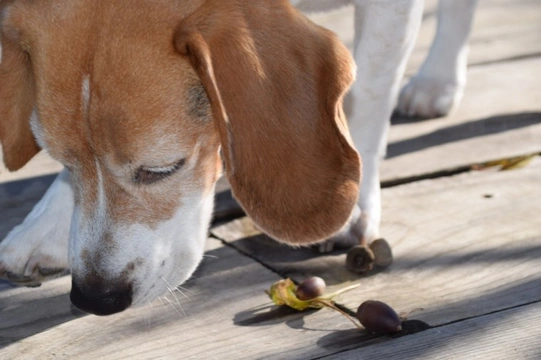
Can acorns poison dogs?
As autumn and winter approach and the leaves fall off the trees, we (and our dogs, in some cases) begin to notice acorns on the ground once more.
If your dog pays more attention to acorns than most or if they’re the type that picks up and chews anything they come across regardless of the consequences, you are probably wondering “are acorns poisonous to dogs?” Yes, unfortunately they are, and you should not let your dog eat acorns.
This article will tell you more about whether or not acorns can poison dogs, and how worried about this you should be.
What are acorns?
Acorns are also known as “oak nuts” in some areas, and they are a type of nut produced by oak trees, and some other trees that are close relatives of our native oaks. They contain the seeds that grow into other oak trees, and for many of us, are a real symbol that autumn is here!
If you walk your dog in parks or other areas where oak trees grow, particularly large ones, you probably see huge quantities of acorns on the ground every autumn and coming into winter too.
You might well also see lots of squirrels gathering up acorns to eat as fuel for the winter, which might lead you to believe that they’re safe to ingest if squirrels eat them. So, are acorns poisonous to dogs or not?
Can acorns poison dogs?
Yes, acorns might be fine for squirrels but they’re toxic to dogs. Raw acorns are also toxic to people, although historically when prepared in a certain way, they were an important source of human food in some cultures.
If your dog eats acorns, they can poison them.
What makes acorns poisonous to dogs?
So, why are acorns poisonous to dogs and how serious is it if your dog eats an acorn, or several of them?
Well, acorn ingestion causes a type of toxicity called Quercus poisoning, which occurs as a result of the naturally occurring tannins in acorns, and other compounds that are toxic to dogs too.
Eating leaves from the oak tree can also cause Quercus poisoning in dogs too, although dogs aren’t generally prone to eating leaves.
Quercus poisoning or acorn poisoning in dogs causes a fairly acute stomach upset that may well involve vomiting and diarrhoea and potentially pain, and in serious cases where a dog eats a lot of acorns (this being relative to the dog’s size) a dog eating acorns can result in kidney failure that may ultimately prove fatal.
On top of this, acorns are very hard and apt to form sharp splinters when your dog chews them, adding in the further risks of your dog developing an internal blockage or obstruction due to the acorns, or internal damage from the sharp edges.
Is it a problem if my dog chews acorns?
If your dog chews acorns but doesn’t eat them, they’re at somewhat lower risk than if they actually swallowed and ate acorns. However, chewing up an acorn without actually eating it still means that your dog will ingest tannins, and so may still become sick. Again relative to the size of the dog, this might be severe enough to cause kidney failure.
Are dogs actually likely to eat acorns?
Talking about a potential poison for dogs is meaningless without also discussing whether or not it is likely that a dog would come into contact with or choose to eat acorns in the first place.
Oak trees are numerous in the UK and so, so are acorns during the autumn season, which means that contact with acorns by dogs is very common, and dogs tend to be inquisitive animals that explore the world with their mouths as well as tending to eat first and think later.
Many dogs will pick up acorns in their mouths and then drop them, and this in itself is unlikely to be a problem.
If your dog bites into an acorn they will probably find it to have a bitter taste and so, they’re likely to spit it out. They may still ingest tannins from doing this, but unless they chew the acorn, most dogs will be fine.
However, for dogs that swallow acorns whole or that do seem to find some payoff they like in chewing or eating them, and there are dogs like this out there, the problem is real.
What should I do if my dog ate acorns?
If you know that your dog ate an acorn or several acorns or reasonably suspect that they might have done – or if they chewed some acorns up without swallowing them – contact your vet immediately.
Acorn poisoning in dogs can be serious and may cause kidney failure, and your vet will be able to assess the risk and potential scope of the problem. They may tell you to bring your dog along to the clinic for treatment or monitoring, so don’t delay in calling the vet.



